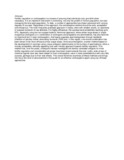| dc.description.abstract | Fertility regulation or contraception is a means of ensuring that individuals only give birth when necessary. It is an important instrument in controlling, not only the growth of human population, but also managing the feral pest population. To date, a number of approaches have been advanced with varying degrees of success. Regardless of the approach, the contraceptive method should be safe, acceptable and efficacious. The most frequently practised approach in males, often with reliable results, is vasectomy or surgical occlusion of vas deferens. It is highly efficacious; the success level sometimes reaching up to 97%, especially using the non-scalpel method. Hormonal approach, where either large doses of single exogenous androgens or a combination of androgens and progestins are administered, has also become an important tool in male contraception. Androgens suppress spermatogenesis through feedback inhibition of pituitary follicle stimulating hormone (FSH) and, in this regard, a hormonal combination has been shown to be more efficacious than single doses. Immunocontraception, another method based on the development of vaccines using unique antigenic determinants on the surface of spermatozoa, offers a morally acceptable, ethically appealing and user friendly approach towards fertility regulation. This method has, over the years, undergone intense investigation to identify candidate antigens for male fertility regulation and considerable advances have been made towards this end. Lastly, wide arrays of chemical agents have also been tested for their contraceptive value in male candidates but with very little success, perhaps due to their side effects. This review therefore examines all these methods and brings into focus the level of advancement in the quest for an effective contraceptive agent using any of these approaches. | en_US |

